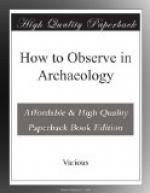General Principles of a Model Law of Antiquities for the Near and Middle East.
The following statement of Principles which should form the foundation of the Laws of Antiquities to be enacted for the various Provinces formerly under Turkish rule was drawn up by an International Committee in Paris and recommended to the Commission for regulating the Mandates under the League of Nations. It follows closely the Recommendations of the Archaeological Joint Committee on the same subject. It was proposed at the same time that the Treaty with Turkey should enjoin the adoption by that Power of a Law of Antiquities on the same lines:
Principes du reglement devant etre adopte par chacune des Puissances mandataires.
1. ‘ANTIQUITY’ signifie toute construction, tout produit de l’activite humaine, anterieur a l’annee 1700.
2, Toute personne qui, ayant decouvert une antiquite, la signalera a un employe du Departement des Antiquites du pays, sera recompensee suivant la valeur de l’objet, le principe a adopter devant etre d’agir par encouragement plutot que par menace.
3. Aucun objet antique ne pourra etre vendu sauf au Departement des Antiquites du pays, mais si ce Departement renonce a l’acquerir la vente en deviendra libre. Aucune antiquite ne pourra sortir du pays sans un permis d’exportation dudit Departement.
4. Toute personne qui, expres ou par negligence, detruira ou deteriorera un objet ou une construction antique, devra etre passible d’une peine a fixer par l’autorite du pays.
5. Aucun deblaiement ni aucune fouille ayant pour objet la recherche d’antiquites ne seront permis sous peine d’amendc, sauf aux personnes autorisees par le Departement des Antiquites du pays.
6. Des conditions equitables devront etre fixees par chaque Puissance mandataire pour l’expropriation temporaire ou permanente des terrains qui pourraient offrir un interet historique ou archeologique.
7. Les autorisations pour les fouilles ne devront etre accordees qu’aux personnes qui offrent des garanties suffisantes d’experience archeologique. Aucune des Puissances mandataires ne devra, en accordant ces autorisations, agir de facon a ecarter, sans motif valable, les savants des autres nations.
8. Les produits des fouilles pourront etre divises entre le fouilleur et le Departement des Antiquites de chaque pays dans une proportion fixee par ce Departement. Si, pour des raisons scientifiques, la division ne semble pas possible, le fouilleur devra recevoir, au lieu d’une partie de la trouvaille, une juste indemnite.
INDEX
Abu Shahrein, 85, 88, 90.
Achaemenian period in Mesopotamia, 93.
Aegean, prehistoric age in the 36 f: pottery
in Palestine, 73.
Aeneolithic; see Chalcolithic.
Akkadian period, 90.
Alphabets: see Inscriptions.
Aramaic inscriptions, 62, 66; in Mesopotamia, 93.
Archaeological Joint Committee, 38.
Arches, corbelled, 40.
Arcosolium tombs, 71 f.
Asia Minor, 47 ff.
Assyrian period, 91.
Attic pottery, 44 f.




